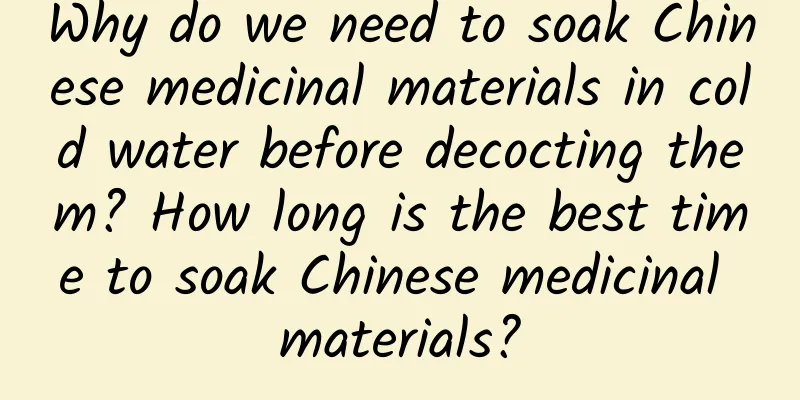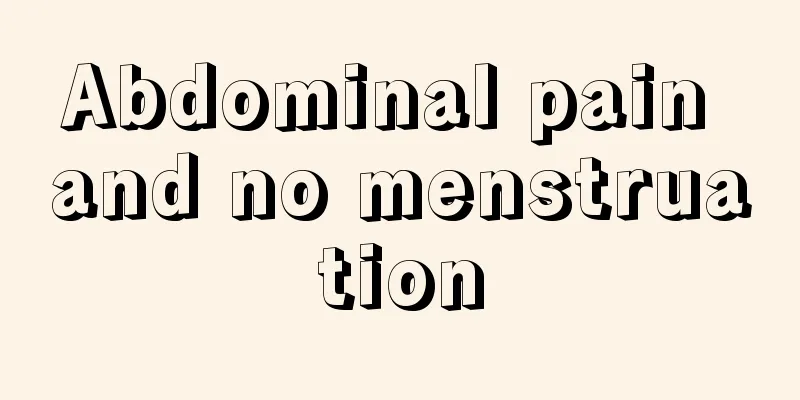Why do we need to soak Chinese medicinal materials in cold water before decocting them? How long is the best time to soak Chinese medicinal materials?

|
In daily life, many patients do not soak the Chinese medicine in cold water before decocting it in order to save time, but directly add hot or cold water to decoct it. Little do they know that this will cause the protein contained on the surface of the medicinal materials to coagulate and the starch to gelatinize, affecting the exudation and dissolution of the active ingredients of the medicine, and even failing to achieve the effect of treating the disease. Let's take a look at how to decoct Chinese medicine with Encyclopedia Knowledge Network. Soak the Chinese medicine in cold water before decocting itSoaking Chinese medicine in cold water for a period of time before decocting it is an important part of the Chinese medicine decoction method. However, in daily life, many patients mistakenly believe that the soaking is not good, and they decoct the Chinese medicine immediately, or even add hot water directly to decoct it to save time. This is not conducive to the extraction of effective ingredients and will affect the efficacy. Most Chinese medicinal materials are dry products, which are fine and hard in texture. The active ingredients have crystallized or precipitated in the cells, and water cannot easily penetrate. If they are soaked in cold water for a period of time before decoction, the medicinal materials will become soft, the cells will swell, and the active ingredients will be easily decocted out. Some medicinal materials contain a lot of starch and protein. If they are decocted without soaking, the starch on the surface of the medicinal materials will gelatinize, the protein will coagulate, and the capillaries on the surface of the medicinal materials will be blocked, so that water cannot enter and the active ingredients will not be easily decocted out, affecting the efficacy of the medicine. The soaking time depends on the medicine. For loose-textured medicines such as flowers, leaves, and thin stems, soaking for half an hour is sufficient; for hard-textured medicines such as tubers, rhizomes, seeds, and fruits, soaking for 1 hour is necessary; and for mineral, animal, and shell medicines, soaking time is longer. However, it should be noted that the soaking time should not be too long, especially in summer, to avoid drug deterioration. The water used to soak the medicine should be used directly for decocting the medicine and cannot be poured away. How long is the best time to soak Chinese medicine?The container for decoction is preferably a casserole, enamelware, or stainless steel. Ironware is strictly prohibited. Chinese medicine should be soaked in cold water for about 20 minutes before decocting. The amount of water used for decoction is generally enough to soak the medicine surface 1-3 cm. For large doses and loose and water-absorbing medicines, the amount of water can be appropriately increased. Before decocting the herbs, soak them in cold water for a while. If they are leaves or flowers, soak them for about an hour. If they are roots or fruits, soak them for more than two hours. At the same time, seasonal factors should also be considered. For example, the soaking time should be shorter in summer and slightly longer in winter. The general principle is that the higher the room temperature, the shorter the soaking time. How long does it take to boil Chinese medicine?The boiling time of Chinese medicine should be determined according to the medicinal properties. Different medicines have different boiling times, and the general boiling time is 30 minutes. Antipyretic medicines, heat-clearing medicines, and aromatic medicines should not be boiled for a long time. After boiling, boil for 15-20 minutes. Tonic medicines should be boiled with high heat first, and then slowly boiled with low heat for 40-60 minutes. Stir the medicine 2-3 times when decocting. Each dose of Chinese medicine is generally decocted twice, and the second decocting time can be slightly shorter. Precautions for decoction of Chinese medicineBecause the texture and properties of Chinese medicines often vary significantly, the decoction method or decoction time is often different, such as decocting first, adding later, wrapping, etc. When decocting medicine, attention should be paid to the heat, and the control of the heat should be based on the nature and texture of the medicine. For example, antipyretic drugs are suitable for rapid decoction with high heat, while tonic drugs are decocted with low heat. |
<<: What is benzopyrene? How is benzopyrene produced? Is benzopyrene toxic?
>>: What causes bad breath? The best way to treat bad breath and what to eat to relieve it
Recommend
If you have urinary stones, eating these is more effective than medicine
Urinary stones are a common disease. Patients wil...
Can pregnant women eat Chinese food?
Han vegetable is a common wild vegetable in real ...
Why do humans "lose" most of their memories before the age of 3? The answer is beyond your imagination
From the day you were born, to babbling, to learn...
How to eat hot pot cleverly? What should mothers pay attention to when eating hot pot while breastfeeding?
Hot pot has very high calories. Due to the high t...
What is the reason for women's hair loss?
Hair loss is one of the main problems faced by ma...
Why do I have a headache during my period?
Menstruation can be said to bring a lot of inconv...
Does running a marathon hurt your knees? Can anyone run a marathon?
17th In the Xi'an Marathon One runner stopped...
How much does painless curettage cost?
Painless uterine curettage is a type of uterine c...
What is the best medicine for female urethritis?
In life, there are many reasons that can cause us...
Sea buckthorn seed oil suppository excrement picture
It is not surprising that women will have various...
How to take care of normal breasts for women
Breasts are important organs of women. They not o...
Female lower body odor
In life, many female friends are often troubled b...
Six months pregnant, do heart ultrasound
During pregnancy, pregnant mothers have a very di...
Can I drink Rhodiola during my period?
Rhodiola rosea is a common Chinese herbal medicin...
What causes pimples on female vulva?
Sometimes, small bumps will appear on the vulva o...









